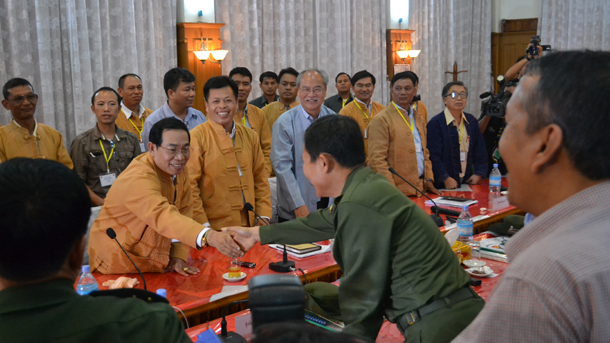The Shan State Army (SSA) can implement its plan to eliminate narcotics within six years if it is allowed to cooperate with the Burmese government, according to SSA sources.
The SSA has in the past been accused of involvement in illicit drugs production.
At a recent meeting at the group’s headquarters, SSA leaders told The Irrawaddy that its political wing, the Restoration Council of Shan State (RCSS), has already laid out its policy for drugs eradication, which includes crop substitution and rehabilitation components. They said, however, that obstacles imposed by the government have made it more difficult for the two sides to work together.
“We have already developed a six-year project for the elimination of narcotics drugs and it can be implemented within this time frame if we can cooperate with the government,” said Lt-Gen Yawd Serk, the chairman of the RCSS.
He said the RCSS knows about drug problems in the country and that consumption of drugs has not only been among ordinary citizens but has also spread to the government’s army and police forces. The government set its own policy quite long ago focusing on the eradication of narcotics, but has not been successful due to a lack of cooperation with his organization, he said.
“If the government goes with its plan and we go with ours, we may be at odds with each other and clashes may occur again,” said Yawd Serk. “Our plan incorporates rehabilitation activities and we won’t use any form of force in implementation.”
He also added that although the government claims that its drug eradication plan has resulted in a decrease of poppy cultivation in areas where it has been implemented, the situation is in fact the opposite: poppy cultivation and more drug users are now more common in these areas, he said.
Sai Seng Wan, the secretary of the RCSS’s Anti-Narcotics Task Force (ANTF), told The Irrawaddy that the government should guarantee security for ANTF members in order to do fieldwork for drugs eradication. The ANTF’s actions do not rival those of the government, but actually support government efforts, he said.
“We are committed to this cause and need assurance for our security to be able to visit poppy-growing areas and educate people regarding crop substitution and the danger of heroin,” said Sai Seng Wan. “Otherwise, if we don’t have personal security, fighting may happen again. Thus, the government needs to cooperate with us to make this plan effective.”
He said the RCSS/SSA also pays close attention to the eradication of methamphetamines, which is produced by mobile units.
The Irrawaddy contacted Burma’s Ministry of Home Affairs for comment on the RCSS/SSA’s proposed cooperation, but the ministry refused to to give any answer.
In late 2011, SSA forces reportedly raided a camp belonging to the Wan Parng militia group and seized chemicals, manufacturing equipment and drugs that it later handed over to the government.
The Wan Parng militia group separated from the RCSS/SSA in 2006 and has been under the government’s control since.
In early August of last year, Yawd Serk also invited the United Wa State Army, which shares a frontier border with the SSA, to cooperate with his group in drugs eradication.
The UWSA is also known for manufacturing and trading illicit drugs and its leader, Wei Hsueh-Kang, remains wanted by the Bureau for International Narcotics and Law Enforcement Affairs for drug offenses committed within the United States, which has offered a US $2 million reward for information leading to his capture.
The United Nations Office on Drugs and Crime still ranks Burma as one of the top drug-producing countries in the world. Burmese President Thein Sein has, however, announced that his country’s plan for the elimination of narcotic drugs will be successful in 2014.
















